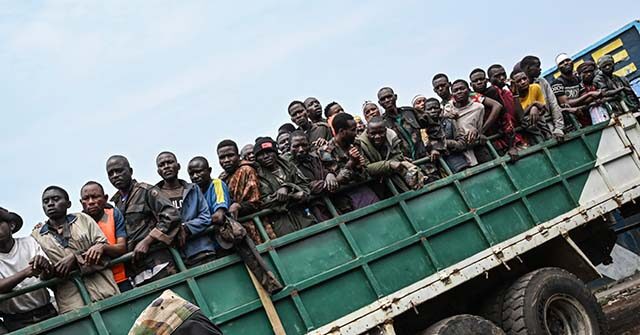President Donald Trump said on Thursday that the conflict between Rwanda and the Democratic Republic of the Congo (DRC) is a “very serious problem.”
“You’re asking me a question about Rwanda, and it is a very serious problem, I agree, but I don’t think it’s appropriate right now to talk about it. But it is a very serious problem,” Trump said when asked by reporters if he had a plan to resolve the conflict.
The DRC is fighting a powerful offensive by a vicious insurgency called M23, which is supported by the Rwandan government. When the rebels pushed into the eastern provincial capital of Goma this week, Rwandan troops marched in right beside them.
The Rwandans claim they sent their forces into the DRC to neutralize a different insurgent group called the Democratic Forces for the Liberation of Rwanda (FDLR), a violent ethnic militia that Rwanda accuses the DRC of harboring.
The DRC, in turn, accuses Rwanda of arming, training, and coordinating M23 in a bid to destabilize the eastern Congo and grab valuable territory. This week’s conflict over Goma included substantial exchanges of fire between Rwandan and Congolese troops.
The entire conflict has its roots in the infamous 1994 Rwandan genocide, where members of the Hutu tribe slaughtered members of the Tutsi tribe on a horrifying scale. The FDLR is the Hutus, while M23 is largely composed of Tutsis, and Rwandan President Paul Kagame is of Tutsi extraction.
M23 leaders said Friday that they intend to consolidate their grip on Goma, then march toward the DRC capital of Kinshasa.
“We want to go to Kinshasa, take power, and lead the country,” M23 political leader Corneille Nangaa said.
Congolese Defense Minister Guy Kabombo Muadimvita vowed his forces would fight to the death to halt the rebel advance, which would have to cover almost a thousand miles to reach Kinshasa.
“We will stay here in Congo and fight. If we do not stay alive here, let’s stay dead here,” he said.
Muadimvita rejected M23’s suggestion for a “dialogue” with the government, saying all correspondence from the insurgency would be “completely burned immediately.”
The U.N. said on Friday it was “deeply concerned” by “credible reports” that M23 forces were advancing south toward Bukavu, another provincial capital.
U.N. human right spokesman Jeremy Laurence said his office has documented deliberate attacks on refugee camps holding internally displaced people (IDPs), along with “summary executions of at least 12 people by M23 between 26 and 28 January.”
The United Nations believes about 4,000 Rwandan troops are currently on DRC soil, but Kagame was still acting like a mere spectator to the conflict on Friday, when he said he has asked Angolan President Joao Lourenco to mediate peace talks between the DRC, M23, and other regional powers.
Kagame also threatened to expand the conflict on Thursday by describing South African peacekeepers in the DRC as a “belligerent force” involved in “offensive combat operations” against the Congolese people, at the behest of the ostensibly oppressive DRC government.
Thirteen South African peacekeepers were among the casualties when M23 attacked Goma this week. Kagame claimed the Congolese army killed the South African peacekeepers, but vowed that his own forces would “deal” harshly with any interference by South African forces.
South Africa, which is politically aligned with the DRC as a fellow member of the South African Development Community (SADC) and also has mineral interests in the eastern Congo, said it would consider any further attacks on its troops to be a “declaration of war.”
On Friday, DRC Foreign Minister Therese Kayikwamba Wagner accused Rwanda of illegally occupying Congolese territory and attempting to overthrow the government in Kinshasa, The Rwandan government responded by insisting it has no interest in “annexation” or “regime change.”
Read the full article here


